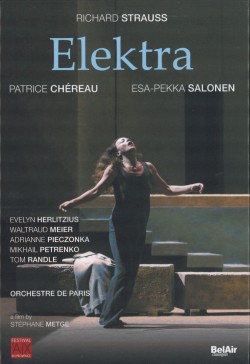 Strauss – Elektra
Strauss – Elektra
Herlitzius; Meier; Pieczonka; Petrenko; Randle; Orchestre de Paris; Esa-Pekka Salonen
Festival Aix-en-Provence; BelAir Classiques BAC110
Richard Strauss’ overheated take on the ancient Sophocles tragedy about one of history’s most infamous dysfunctional families, pushed into fin-de-siècle extremes and Freudian overtones, may have shocked pre-WWI audiences, but even so it provided the composer with a sizable enough income to buy himself a villa in the Bavarian Alps. This latest revival of Elektra became the focal point of the Aix-en-Provence festival in the summer of 2013 in the hands of possibly the greatest director of our generation, Patrice Chéreau, made all the more poignant because he passed away a few months thereafter. His brilliant intellect, inspiration and intuitive feel for music and theatre is manifest from the overall concept to the minutest detail.
Compared with past productions that turned Elektra into a bone-chilling nocturnal bloodthirsty horror show, Chéreau avoided all sensationalism and concentrated on the psychology and interplay of characters, especially the three women principals. As Elektra, German soprano Evelyn Herlitzius is a primal, elemental force, almost like an animal who simply howls through an hour and three quarters at fever pitch, but also capable of tender moments in the “Recognition” scene (with Mikhail Petrenko as Orestes) where Strauss for the first time reaches a major key, a sublime climax of the score. By contrast Chrysothemis, her sister, probably the only normal person among the women, is beautifully sung and acted with maternal instinct and compassion by Torontonian Adrianne Pieczonka who is rapidly achieving world fame. The most problematic – for Chéreau – was the handling of the murderous mother Clytemnestra, traditionally made into a half-insane complex-ridden grotesque witch, but here a woman of dignity, more to be pitied than hated and portrayed superbly by Waltraud Meier.
Finally I must emphasize the enormous contribution of Esa-Pekka Salonen whose firm control of dynamics brings out the subtle inner voices that often disappear in the monolithic sound of a giant Straussian orchestra.



